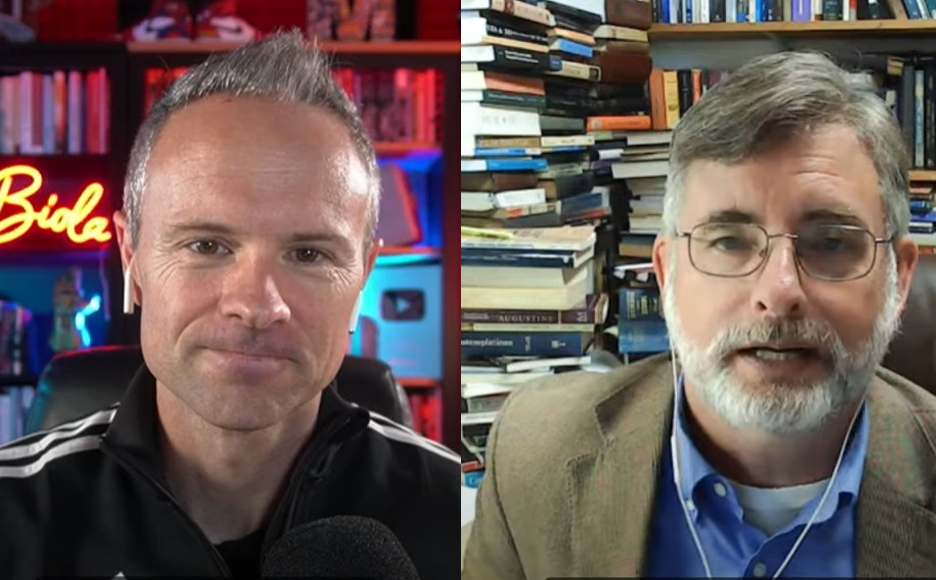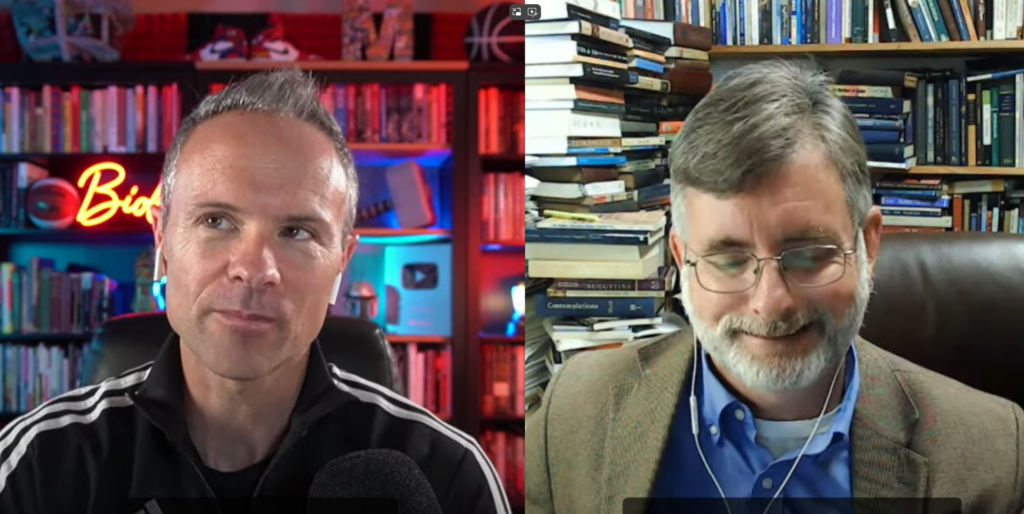Podcast: Play in new window | Download
Subscribe: Spotify | Email | RSS

In this episode I, a Biola University alum (B.A., Philosophy) interact with this video by two current Biola University professors, Dr. Fred Sanders, and Dr. Sean McDowell.
Their goals are to show that the doctrine of the Trinity is coherent (not self-contradictory) and that it fits well with Scripture.
Issues they discuss include:
- What about the fact that the word “Trinity” is not in the Bible?
- Does the Old Testament support the doctrine of the Trinity?
- If the Father eternally generates the Son, does this imply that the Son is not fully divine, since he lacks the divine attribute of aseity (independent existence)?
- If the Father is divine, the Son is divine, and the Spirit is divine, and those are truly three–none is identical to either of the others–isn’t that tritheism?
- Understanding “who God is” through salvation history.
- Biblical language about God’s “Spirit” or “spirit” or “Holy Spirit.”
In my commentary I point out that Dr. McDowell and Dr. Sanders are for the most part avoiding harder objections and issues pressed by unitarian Christians like me. When harder objections are brought up, their answers are lacking. In particular, the biblical problems are much, much harder then they are assuming. How does the Bible teach that the one God is the Trinity when it seems to clearly teach that the one God is the Father, the one formerly called “Yahweh”? How does the Bible teach the full deity of Jesus when it straightforwardly presents him as having limitations which God must lack?
They also ignore that different, incompatible doctrines, such as one-self and three-self Trinity theories all offer the same traditional language–thus, repeating that language does not suffice to clearly communicate a trinitarian theology. Their talk of “the doctrine of the Trinity” mistakenly presupposes that theologians loyal to trinitarian traditions are teaching the same things. They are not.
In the next episode I interact with the remainder of their presentation.
Links for this episode:
podcast 252 – Fred Sanders on Seeing the Trinity in Scripture, and his Secret
podcast 193 – Review of Sanders’s The Deep Things of God – Part 2
podcast 192 – Review of Sanders’s The Deep Things of God – Part 1
podcast 194 – God: One Person or Three? Sanders vs. Buzzard debate
Dustin Smith’s The Biblical Unitarian Podcast
Sean Finnegan’s Restitutio Podcast
Sanders, The Deep Things of God: How the Trinity Changes Everything (2nd ed.)
Tuggy, “Trinity,” Stanford Encyclopedia of Philosophy
Baber, “Trinity,” Internet Encyclopedia of Philosophy
Dustin Smith – The Plural of Majesty
podcast 11 – Tertullian the unitarian – Trinities
Cartwright, “On the Logical Problem of the Trinity”
Date and Tuggy, Is Jesus Human and Not Divine?
Tuggy, “When and How in the History of Theology Did the Triune God Replace the Father as the Only True God?“
podcast 330 – Dr. Joshua Sijuwade on the monarchy of the Father
McIntosh, ed. – Craig vs. Hasker vs. Branson vs. Tuggy – One God, Three Persons, Four Views: A Biblical, Theological, and Philosophical Dialogue on the Doctrine of the Trinity
podcast 189 – The unfinished business of the Reformation
Craig, “Is God the Son Begotten in His Divine Nature?”

podcast 248 – How Trinity theories conflict with the Bible
How Trinity theories conflict with the New Testament
Loke-Tuggy debate: Does the NT Teach that Jesus is Truly Divine?
The Tuggy-Brown debate: Dale’s opening statement
podcast 334 – “Who do you say I am?”
podcast 260 – How to Argue that the Bible is Trinitarian
the concept of a triune God an anachronism in the first three centuries
podcast 26 – Pastor Sean Finnegan on “the Holy Spirit” – Part 2
podcast 25 – Pastor Sean Finnegan on “the Holy Spirit” – Part 1
podcast 271 – Does your Trinity theory require relative identity?
the apologetics blind-spot on numerical identity
This week’s thinking music is “Ridgeway Drive” by Mr. Smith.

The whorethodox trinity of perichorasis is a problem. But the trinity is not a problem. The original trinitarians simply saw the Son and Holy Spirit as Platonic emanations of the divine essence. So subordinate to the Father, not coequal. Equal in some sense, being “of one substance” with the Father became they reside IN his substance. But they are part of his substance and thus less than him. Fully God they are, but the full God theg are not. “The Father is the WhOLe and the Son and Holy Spirit are parts and derivationsn of the whole” as Tertullian said. So the Father IS the trinity, and the Son ans Spirit are members of the trinity. The Father containa the other two persons since he is the whole and they are parts; thus the Father is not a member of the trinity but is the trinity. This is why “God” without further qualification can be uaed to mean either the Father or the Trinity, because the Father is the Trinity (as he contains the other two persons).
“Whorethodox”? That’s a new one. What you call “the original trinitarians” I can subordinationist unitarians. Why? Because they held, like us, that the one God and the Father are one and the same. You are correct that the Logos for them was a lesser, somewhat divine being. Tertullian was unusual in being a materialist about God (and everything real), but yeah, he said what you quoted. For those who didn’t think God was composed of matter, they would think that the lesser divine beings exist somehow because of him and receive from him a degree of divinity. This is not only the Logos and the Spirit, but even stars and planets (assumed to be minor deities) and saved human beings, who “partake of the divine nature.” But of course non of those would have all the attributes which God has, notably, not aseity. They would not say that the Father is the Trinity because the Father is an individual, single reality, and they used the word “Trinity” to mean a triad, a plural referring term for God and these two lesser beings. One way to put it is: they didn’t think God WAS the Trinity, but rather that God was the primary, founding member of the triad.
You’re clearly describing a composite Godhead which is, on the main, condemned as heresy via the Fourth Lateran Council. Since all composites are caused and dependent, if God is composite, then God is caused and dependent. Thus, the Trinity is most definitely a problem.
I don’t think that view of composites is universally held, so the council could be challenged on that basis as being overly restrictive in what it holds. There would of course be philosophical consequences for embracing that which I don’t imagine some Catholics would want (as non-Catholics presumably don’t care what the Lateran Councils said), but at the same time, I’m not sure it would matter for others.
Granted, if the Fourth Lateran Council were wrong about something that would be an issue for conciliar infallibility, but again, only Catholics would need to contend with that.
Hi, Fred. First, one would be hard-pressed to deny the causal dependence of all composites. Every composite is a collection of parts, which makes the composite logically posterior to its components. As such, they are explained, actualized and conserved by something less than they are in order to be what they are. As second-order beings, they cannot be the ground of contingent being for the obvious reason that they are contingent as well.
Second, since most Trinitarians abjure outright composition, whether or not they specifically affirm the councils, composition is definitely something they want to avoid. Their main problem is constructing an explanatory model that avoids composition. It is my contention that they, including Latin Trinitarians, cannot.
Third, composition is also a problem for every other theistic religion. As a classical theist myself, I consider divine simplicity (DS) entirely incompatible withe the Trinity. But I also consider the theistic personalist views of most if not all Unitarians to be just as defective. Since all composites are causally dependent, if God is composite, then God is causally dependent. God is not causally dependent; therefore, God is not composite.
Fourth, the proper strategy for opponents is to either deny the causal dependence of at least some composites (e.g., God) or to deny that what constitutes partialism in classical theism (and, in substance, Eastern Orthodoxy) are actual parts in God. I don’t think either can be ultimately successful.
Regarding Dale’s comments on the Holy Spirit (53:30 – 56:00), I would suggest concluding with 1 Corinthians 2:10-11 (NKJV): “10 But God has revealed them to us through His Spirit. For the Spirit searches all things, yes, the deep things of God. 11 For what man knows the things of a man except the spirit of the man which is in him? Even so no one knows the things of God except the Spirit of God.” Here Paul says that just as the spirit of the man which is in him (not a separate person from himself) knows the things of a man, so also the (S/s)pirit of God knows the things of God (also not a separate person from Himself). Taken at face value, yes, the spirit of God is “God ” (divine) — but not a another, third divine person. But a Trinitarian can’t take Paul’s comparison as it reads. The Trinitarian must assume the Trinity and argue that Paul is only using a human analogy to illustrate the greater Trinitarian divine relationship. Or, the Trinitarian could say that “God” is the Father here, and it is the Father’s spirit being referred to here — not the third person which is the nameless “Holy Spirit.” Either way, the third person, Holy Spirit, would not even be mentioned in this verse. Remember, the decision on the use of upper and lower case letters is based on the translator’s theolgical decision — not the original Greek text, which does not provide such distictions here.
Yes, great points, Rob!
Sanders’s position, at least as he proposed at the end where he said that the persons are names for the singular divine essence, sounds like Modalism. He clearly doesn’t intend that, but that’s what it sounds like.
Not uncommon when it comes to today’s trinitarians. If they say that God is one what but three whos, an obvious interpretation of that is that God the Trinity is a single someone who has three personalities or ways of living which are eternally concurrent.
Comments are closed.